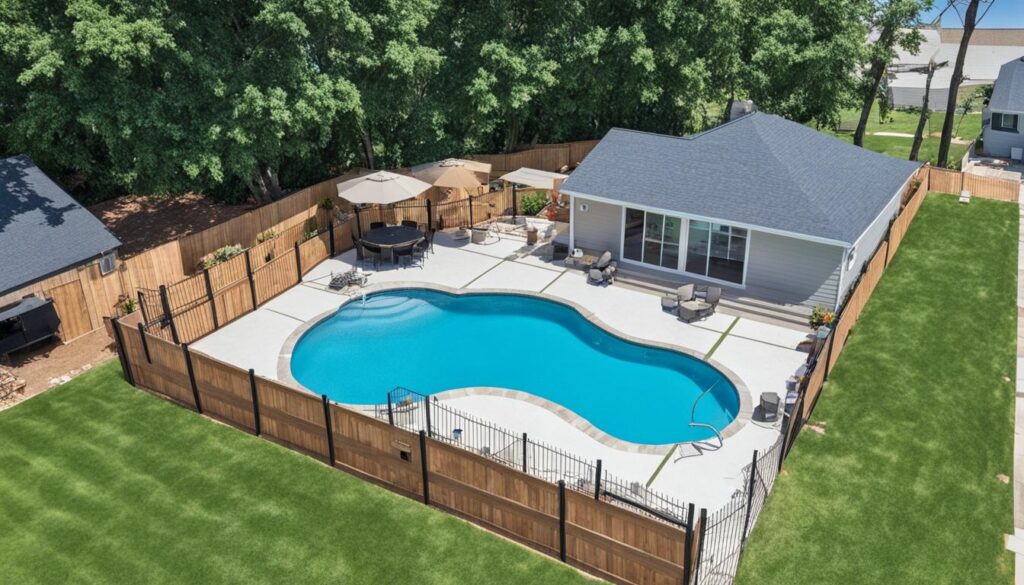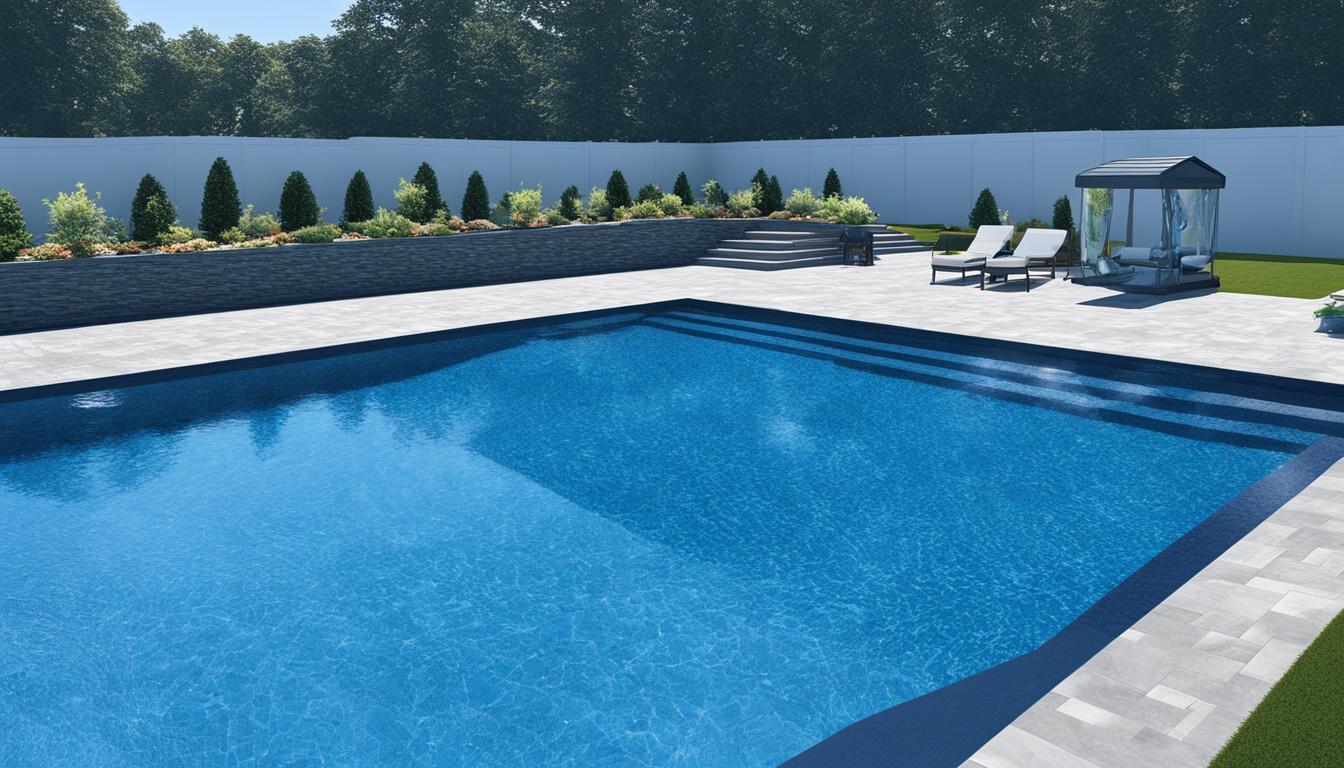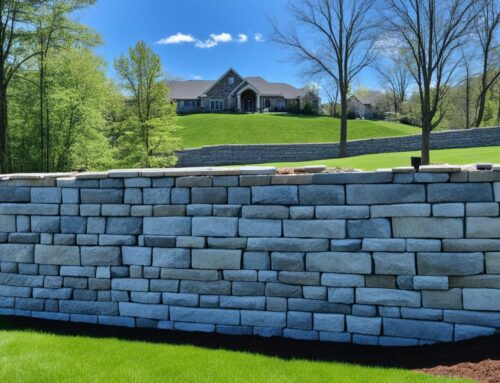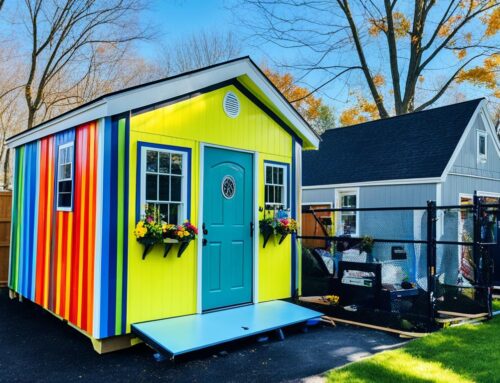If you’re considering installing an above ground pool in New York, it’s important to understand the permit requirements and regulations set forth by the Department of Buildings. Ensuring compliance with these requirements is essential for a smooth and lawful installation process. Let’s take a closer look at what you need to know.
Key Takeaways:
- Obtaining a permit for an above ground pool in NY is necessary to ensure safety and legality.
- Depending on the scope of the work, different permits may be required, such as plumbing permits or permits from a Registered Design Professional or General Contractor.
- Certain work can be done without a permit, but it still must comply with applicable laws and regulations enforced by the Department of Buildings.
- Above ground pools must have permanent barriers to prevent unauthorized access, which must meet specific height, clearance, and opening size requirements.
- Location and zoning regulations dictate where above ground pools can be placed, including setbacks from property lines and neighboring structures.
Traci’s Permits, serving Nassau and Suffolk County in NY, offers unmatched expertise in obtaining timely approvals and ensuring code compliance for hassle-free construction. When it comes to navigating the permit process, trust Traci’s Permits for a smooth journey.
For expert permit assistance, call Traci’s Permits at 631-492-0927.
Work that Can Be Done Without a Permit
According to the NYC Administrative Code, there is certain work that can be done without a permit. This includes ordinary plumbing work, minor alterations, and repairs, as well as the installation of small swimming pools.
However, it is important to note that while these types of work may not require a permit, they must still comply with other applicable laws and regulations enforced by the Department of Buildings. It is recommended to consult the code for a complete list of exempt work and to ensure compliance with all requirements.

Above ground pool owners should also note that while certain work may be exempt from permits, it is essential to prioritize safety and quality. Even without a permit, it is crucial to follow proper construction techniques and adhere to industry standards to prevent accidents and ensure the longevity of the pool.
Exempt Work in NYC
The NYC Administrative Code provides a list of exemptions where work can be done without a permit. Some examples include:
- Ordinary plumbing work, such as replacing faucets or fixing leaks.
- Minor alterations, such as installing shelving or painting walls.
- Repairs, such as fixing broken windows or replacing damaged flooring.
- Installation of small swimming pools meeting specific size criteria.
Compliance with Other Regulations
While these exempt activities may not require a permit, it is important to note that they must still comply with other regulations and applicable codes enforced by the Department of Buildings. These may include requirements for electrical work, structural modifications, or other associated permits. Therefore, it is essential to consult the code and ensure full compliance to avoid any legal or safety issues.
Consulting with a Professional
Although some work can be done without a permit, leveraging the expertise of a professional, such as Traci’s Permits, can ensure a smooth construction journey. Traci’s Permits specializes in navigating the permit process in Nassau and Suffolk Counties, providing comprehensive assistance to homeowners planning above ground pool installations. Their team of experts ensures timely approvals and code compliance, allowing pool owners to enjoy their new addition with peace of mind. For expert permit assistance, call 631-492-0927. Trust Traci’s Permits for a hassle-free construction process.
| Exempt Work | Work Requiring a Permit |
|---|---|
| Ordinary plumbing work | Major plumbing alterations |
| Minor alterations and repairs | Structural modifications |
| Installation of small swimming pools | Electrical wiring |
Work Requiring a Licensed Master Plumber
While certain plumbing work may be exempt from the permit requirement, such as ordinary maintenance and repair, any work that goes beyond these limitations must be performed by a Licensed Master Plumber. This includes the repair, replacement, and relocation of plumbing, gas, and fire protection systems. It is essential to hire a qualified professional who possesses the necessary skills and expertise to ensure that the plumbing work is carried out according to the required standards and regulations.
A Licensed Master Plumber has undergone rigorous training and possesses the knowledge and experience to handle complex plumbing projects. By engaging a Licensed Master Plumber, you can trust that the plumbing work will be completed safely and efficiently. Additionally, a monthly report must be submitted to the Department of Buildings by the Licensed Master Plumber for any plumbing work carried out, ensuring accountability and compliance with regulatory requirements.
Traci’s Permits understands the importance of engaging a Licensed Master Plumber for plumbing work that requires a permit. We work with a network of licensed professionals who can provide the expertise needed to ensure a successful and code-compliant plumbing installation. Trust us to handle the permit process smoothly, ensuring that your plumbing work meets all legal and safety requirements.
For expert assistance with plumbing permits and a seamless permit journey, trust Traci’s Permits. Contact us today at 631-492-0927 to learn more about our services and how we can help with your plumbing project.
Work Requiring a Registered Design Professional or General Contractor
Certain aspects of above ground pool construction, such as piping, fuel-burning equipment, ductwork, and electrical wiring, require the expertise of contractors with specialized licenses. To ensure the proper execution of these tasks and obtain the necessary permits, it is essential to hire a Registered Design Professional or General Contractor.
The involvement of a Registered Design Professional is crucial in the construction process. They are responsible for creating and submitting detailed construction plans to the Department of Buildings for approval. These plans outline the design and specifications of the pool’s infrastructure, ensuring compliance with safety standards and regulations.
“Engaging the services of a qualified Registered Design Professional is vital for successfully navigating through the permit issuance process.”
General Contractors, on the other hand, are experts in overseeing and coordinating various construction activities. They are licensed professionals equipped with knowledge in managing projects, ensuring contractors adhere to building codes, regulations, and safety standards.
By enlisting the help of a Registered Design Professional or General Contractor, pool owners can streamline the complex permit issuance process and ensure compliance with all necessary requirements.
Permanent Barrier Requirements for Above Ground Pools
According to the New York State Residential Code, above ground pools must have permanent barriers in place to prevent unauthorized access and ensure the safety of users. These barriers can be mounted on top of the pool structure or be integral parts of the pool structure itself. They play a crucial role in reducing the risk of drowning or near-drowning incidents.
When it comes to above ground pool barriers, there are specific requirements that must be met. These requirements are outlined in the New York State Residential Code and are designed to ensure the effectiveness of the barriers. Here are some key points to consider:
- Height: The barriers must meet a minimum height requirement to deter unauthorized access. The exact height required may vary depending on local regulations, so it’s important to check with the relevant authorities for specific guidelines.
- Clearance: The barriers should have minimal clearance from the ground to prevent children or pets from crawling or squeezing underneath.
- Opening Size and Configuration: The openings in the barriers must be of a size and configuration that does not allow the passage of small children. This helps ensure that the barriers effectively prevent unauthorized entry.
- Compliance with Standards: The pool and pool structure, including the barriers, must comply with the American National Standard for Aboveground/ Onground Residential Swimming Pools. This standard sets forth guidelines for the design, construction, and safety features of above ground pools.
If the means of access to the above ground pool is a ladder or steps, these must also be secured, locked, or surrounded by a complying swimming pool barrier. This additional measure further enhances the safety of the pool.
It is essential to prioritize pool safety by ensuring that above ground pool barriers meet all the necessary requirements. By doing so, pool owners can enjoy their pool with peace of mind, knowing that unauthorized access is minimized and the risk of accidents is reduced.
Traci’s Permits offers expert assistance with Nassau and Suffolk County NY permits, including those required for above ground pools. With our in-depth knowledge of the local regulations and commitment to timely approvals and code compliance, we can make your permit journey smooth and hassle-free. Contact us today at 631-492-0927 to discuss your permit needs and ensure a successful pool installation.
Location and Zoning Regulations for Above Ground Pools
Above ground pools must be placed in accordance with specific location requirements. These regulations include setbacks from property lines, neighboring structures, and features like cesspools or sewage disposal systems.
In the Village of Floral Park, for instance, a minimum distance of five feet from any rear or side line of the lot is mandatory. Additional distance requirements are based on the surface area of the pool. Furthermore, the pool should be situated in a rear yard and should not occupy more than 30% of the rear yard area.
To ensure compliance with these specific location regulations, it is crucial to consult the local zoning ordinances and obtain the necessary permits.

Zoning Requirements for Above Ground Pools in the Village of Floral Park
| Location Regulation | Requirement |
|---|---|
| Distance from rear or side lot line | At least 5 feet |
| Additional distance based on pool surface area | Varies; consult local ordinances |
| Location | Rear yard |
| Maximum pool size relative to rear yard area | 30% |
Please note that these requirements may vary based on your specific location. It is crucial to consult with the relevant local authorities and obtain the necessary permits to ensure compliance with the zoning regulations applicable to your area.
Conclusion
Installing an above ground pool in New York requires careful adherence to the permit requirements, codes, and regulations set forth by the Department of Buildings and local authorities. Understanding the exemptions, permit obligations, and safety requirements for plumbing, electrical work, and barriers is crucial for a smooth and lawful installation process.
Consulting a licensed professional, such as Traci’s Permits, can provide expertise in obtaining timely approvals and ensuring code compliance for hassle-free construction. With their assistance, pool owners can navigate the complex permit process and enjoy their above ground pools safely and legally in the state of New York.
Traci’s Permits offers unmatched expertise in obtaining Nassau and Suffolk County NY permits. We specialize in securing timely approvals and ensuring code compliance. Trust us for a smooth permit journey. For expert permit assistance, call 631-492-0927.
FAQ
Do I need a permit for an above ground pool in New York?
Yes, in New York, you need a permit for the installation of an above ground pool. The requirements for obtaining a permit are determined by various codes and regulations enforced by the Department of Buildings and local authorities.
What work can be done without a permit?
Certain work, such as ordinary plumbing work, minor alterations, and repairs, can be done without a permit in New York. However, it is important to note that these types of work still need to comply with other applicable laws and regulations.
What work requires a licensed master plumber?
Any plumbing work that goes beyond the limitations of minor alterations and repairs must be performed by a Licensed Master Plumber. This includes the repair, replacement, and relocation of plumbing, gas, and fire protection systems.
What work requires a registered design professional or general contractor?
Work such as piping, fuel-burning equipment, ductwork, and electrical wiring require the services of a Registered Design Professional or General Contractor. The Registered Design Professional must submit construction plans for approval before the permit can be issued.
What are the requirements for permanent barriers for above ground pools?
Above ground pools in New York are required to have permanent barriers that prevent unauthorized access. These barriers can be mounted on top of the pool structure or constituted by the pool structure itself. Specific height, clearance, and opening size and configuration requirements must be met.
What are the location and zoning regulations for above ground pools?
The location of above ground pools must adhere to specific requirements, including setbacks from property lines, neighboring structures, and certain features like cesspools or sewage disposal systems. It is important to consult local zoning ordinances and obtain the necessary permits to comply with the specific location regulations.
Source Links
- https://www.nyc.gov/site/buildings/property-or-business-owner/project-requirements-owner-outdoor-pool.page
- https://dos.ny.gov/system/files/documents/2021/06/2020-05-above-ground-swimming-pool-barrier-requirements_rev1.pdf
- https://fpvillage.org/wp-content/uploads/2021/12/FP-Guidelines-Pool-Requirements-NYS-2020-Code.pdf












